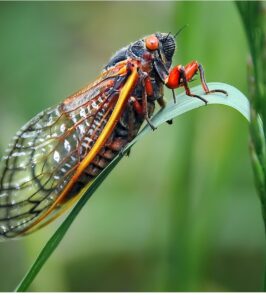
If you live in Northeast Ohio then you’ve probably heard the 17-year periodic cicadas singing loudly in the trees over the past few weeks. Major cities throughout our region reporting large numbers of cicadas include Hudson, Aurora, Kent, Cuyahoga Falls, Ravenna, Streetsboro, Solon, and Stow Ohio. The scientific names for Brood V are Magicicada cassinii (Fisher, 1852), Magicicada septendecim (Linnaeus, 1758), and Magicicada septendecula Alexander and Moore, 1962. These periodical cicadas have a 17-year life cycle and the last time they emerged was in 1999. Brood V cicadas have black bodies, red-orange eyes, and shiny iridescent wings.
The periodic cicadas have the longest life cycle of any other insect in the world and we have the privilege of seeing this amazing little insect this year. Every 17 years this cicada emerges, when the ground temperature reaches 64 degrees, to mate and lay eggs in the trees. They leave behind nickel-sized holes in the ground and after mating the adults will die and we won’t see them again until 2033.
Local lawn care experts are expecting billions this year with a concentration of up to 1.4 million per square acre. Other than an annoying siren-like sound and their sheer numbers, these little guys are not harmful to humans at all as they don’t bite, sting or pinch. They drink sap from the trees and lay eggs in slits they make in branches near the top of the trees. Unfortunately, the egg-laying process will leave us with tip dieback on trees and might be unsightly for a season or two.
Cicadas provide food for all animals and become rich in organic fertilizer as well. Newer 1-3-year-old trees and shrubs should be covered by cheesecloth to avoid damage but they will not be killed by cicadas. You may see their exit holes in your lawn or under trees. These little holes will disappear on their own in most cases but can sometimes attract wasps or become ground nests for certain bees. If this is a concern, a little topsoil raked over the holes will prevent unwanted nesting.
If you are in an area where millions of cicadas have died near your home or in your backyard, you may want to remove the remains as they will have an odor as they decay. Putting them in a compost pile will make for great fertilizer later on. In general, the periodic cicada is an amazing little insect that we only get to see a few times in our lifetime.





